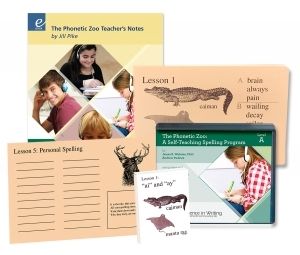Review of IEW's The Phonetic Zoo Level A
 I have been more than fortunate to review several products from Institute for Excellence in Writing. If you think that this company is simply the gold standard in writing programs, you are only partially right. They absolutely are that, but they are so much more! This time around we reviewed Phonetic Zoo Spelling Level A [Starter Set]. This set includes the following products: five audio CDs, lesson cards with spelling words and jingles, personal spelling cards, zoo cards, downloadable teacher's guide, link to streaming video of Spelling and the Brain seminar.
I have been more than fortunate to review several products from Institute for Excellence in Writing. If you think that this company is simply the gold standard in writing programs, you are only partially right. They absolutely are that, but they are so much more! This time around we reviewed Phonetic Zoo Spelling Level A [Starter Set]. This set includes the following products: five audio CDs, lesson cards with spelling words and jingles, personal spelling cards, zoo cards, downloadable teacher's guide, link to streaming video of Spelling and the Brain seminar.

The best way to understand the Phonetic Zoo approach to spelling is to read about it on IEW's website. To summarize, this program is different from other spelling programs in many ways. First, the program is designed to work for different kinds of learners. Students hear the words pronounced on the audio CDs, they see the words written on the lesson cards, they write the words on their paper, and they associate them with the zoo animals on the jingle/reward cards. Second, there is no formal word study or busy work with Phonetic Zoo. There is no workbook with an activity to do each day, followed by a spelling test on Friday. Rather, you present the lesson to the students using the large flash card and give the student(s) the small flash card. SThen, students listen to the audio CD (headphones are recommended for reasons explained on the webpage linked above), hear the words pronounced, write them down, and then check them *and correct them* themselves (again, via the audio CD - it has a "checking track"). They repeat the above process daily until they make a 100 on the lesson twice in a row. There is also personal spelling and a final exam.
The Twins and Phonetic Zoo
I used Phonetic Zoo Level A with Mary-Catherine and Michael (both 10). Technically, it is for 3rd grade and up, and the twins are in 5th grade-ish. They are also completely different when it comes to spelling. Mary-Catherine is a pretty natural (but very lazy because she goes so fast) speller. Michael is dysgraphic and both writing and spelling don't come easily for him. He has come very far in the past few years, though. It wasn't that long ago, it feels like, that I couldn't even recognize what he was writing as words. It didn't matter that he read far above grade level; he just couldn't translate the words in his head onto paper. Because of that issue, we have tried numerous spelling programs. So many of them just seem pointless, though. He'll study and he'll try, and something just won't *stick*. He gets so frustrated. I was very excited to try Level A of Phonetic Zoo. We have Level B (Therese used it many moons ago), and while it was okay for Mary-Catherine, it frustrated Michael. The words were just a little too hard. I wanted to see what would happen if I started them both at the beginning of the program.
The good news is that they were already familiar with the Phonetic Zoo model and they both really liked it. Further, because they had already worked through part of Level B, Level A didn't seem daunting. We started on a Monday and I taught them the words as suggested by the IEW site (basically just showing them the card and going over the words). They then sat down to listen to the CD, write the words, and make their corrections. Neither twin got a 100 on their first effort, despite thinking that this was going to be easy because it was Level A. In fact, both were a bit dismayed. That's okay, though! There's always tomorrow with Phonetic Zoo. They both like the fact that they make their own corrections, and they both insist on having an actual "grade" on their paper, regardless of the fact that I tell them that the grade is not what's important - mastering the words is.
One thing that is really awesome about this program is that the card sets are the same for all three levels, because each lesson in each level tests the same concept. So, there are three word lists on each card. What that means for us is that because I have two levels of Phonetic Zoo, each twin can look at his/her own large card to learn the words, and each twin can collect his/her own small zoo card as a reward. Now, you can still definitely use this program with multiple children and only have one set of cards, but if you plan on using it over time with multiple children, don't be put off by the fact that the card sets are always the same. That can definitely work to your advantage and make things easier (if you have kids who each like to have their own of something (and in my family that happens rarely enough that it is worthy of mention when it does.)). In essence, it just makes the program easier to use with multiple children, either of the same age/level or of different ones.
Michael and Mary-Catherine really like Phonetic Zoo. The fact that each spelling lesson is encapsulated by a catchy jingle really aids in remembering the concept being taught (although it's amazing to me how often, at the beginning of the time period during which they are learning the lesson, they seem to completely forget that there is a unifying theme and go maverick with the spelling). I, too, like the jingles (although spelling is, thankfully, not one of my infinite number of challenges). *I* love that Phonetic Zoo is essentially completely self-teaching. There is very little that I have to do, and as I have indicated in recent posts, that really appeals to me right now. I want to spend our homeschooling time talking to my kids about history and theology, not about spelling and phonics, but I definitely want them to be continuing their study of spelling and phonics. Once again, IEW comes through for me!
As usual, the Crew is reviewing more awesome IEW products, including some I have not even heard of yet but am very anxious to check out! Join me in doing so by clicking the banner below:










No comments:
Post a Comment